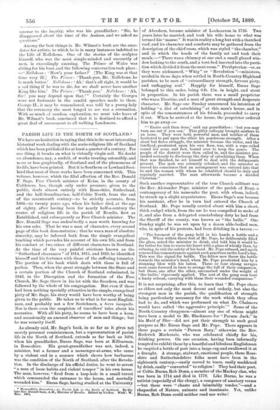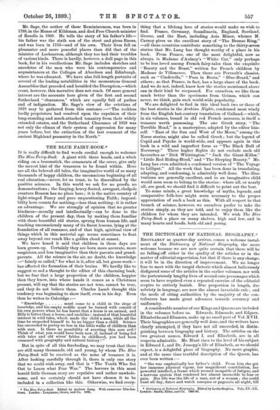PARISH LIFE IN THE NORTH OF SCOTLAND.* `WE have no
hesitation in saying that this is the most interesting historical work dealing with the socio-religious life of Scotland which has been published for at least a quarter of a century. For one thing, it breaks on what is virtually virgin soil. No doubt an abundance, nay, a surfeit, of works treating ostensibly, and more or less graphically, of Scotland and of the phenomena of its life, have been printed. But it is Southern or Lowland Scot- land that most of these works have been concerned with. This volume, however, which the filial affection of the Rev. Donald F. Sage, Free Church minister of Keiss, in the county of Caithness, has, though only under pressure, given to the public, deals almost entirely with Ross-shire, Sutherland, and the half-Scandinavian, • half-Celtic North, from the end of the seventeenth century—to be strictly accurate, from 1694—to twenty years ago, when his father died, at the age of eighty, after having been for nearly half-a-century the centre of religions life in the parish of Resolis, first as Established, and subsequently as Free Church minister. The Rev. Donald Sage was undoubtedly a man worth knowing for his own sake. That he was a man of character, every second page of this book demonstrates ; that he was a man of absolute sincerity, may be inferred both from the simple evangelical teaching which pervades his account of his own life, and from his conduct at two crises of different characters in Scotland.
At the time of the very painful evictions known as the Sutherland clearances " of 1814, 1815, and 1819, he identified himself and his fortunes with those of the suffering tenantry.
The portion of his book which deals with these is full of pathos. Then, when the great struggle between the State and a certain portion of the Church of Scotland culminated, in 1843, in the Disruption and the formation of the Free Church, Mr. Sage threw in his lot with the Seceders, and was followed by the whole of his congregation. But even if there had been nothing specially attractive in the simple, evangelical piety of Mr. Sage, his story would have been worthy of being given to the public. He takes us to what is for most English- men, and probably not a few Scotchmen, a terra incognita. Nor is there even the suspicion of travellers' tales about his narrative. With all his piety, he seems to have been a keen, and occasionally an amused observer of men and things ; but he was veracity itself.
As already said, Mr. Sage's book, in so far as it gives not merely personal reminiscences, but a representation of parish life in the North of Scotland, extends as far back as 1694, when his grandfather, Eneas Sage, was born at Killearnan, in Ross-shire. His great-grandfather was not, indeed, a minister, but a farmer and a' messenger-at-arms, who came by a. violent end in a manner which shows how barbarous was the condition of the North of Scotland, after the Revolu- tion. In the discharge of his official duties, be went to arrest "a man of loose habits and violent temper" in his own house. The man, however, " fired from a loop-hole in a small turret -which commanded the entrance to the house, and mortally wounded him." Eneas Sage, having studied at the University " Memorabilia Domeatita ; or, Parish Lije in the North of Scotland. By the late Rev. Donald Sage, A.M., Minister of Resale. Edited by hie Son. Wick : W. list. revs.
of Aberdeen, became minister of Lochcarron in 1726. Two years later he married, and took his wife home to what was termed his " manse." It was in reality a long but with a thatched roof, and its character and comforts may be gathered from the description of the chief room, which was styled " the chamber," and in which the heads of the family sat' and took their meals :—" There was a chimney at one end, a small glazed win- dow looking to the south, and a tent-bed inserted into the parti- tion which divided it from the next room." Presbyterian—or, as they were nicknamed, " Whig" or "Revolution "—ministers, needed in these days, when settled in North-Country Highland parishes, to be men of " extraordinary strength, fervent piety, and unflagging zeal." Happily for himself, Eneas Sage belonged to this order, being 6 ft. 2 in. in height, and stout in proportion. In his parish there was a small proprietor who was a libertine, and a man of great strength and desperate character. Mr. Sage one Sunday announced his intention of holding "a diet of catechising" at this man's house, and in spite of the remonstrances of his friends, proceeded to carry it out. When he arrived at the house, the proprietor ordered him to go away :-
" Easier said than done,' said my grandfather ; but you may turn me out if you can.' This pithy colloquy brought matters to an issue. They were both powerful men, and neither of them hesitated to put upon the other his ponderous strength. After a short but fierce struggle, the minister became the victor, and the landlord, prostrated upon his own floor, was, with a rope coiled round his arms and feet, bound over to keep the peace. The people of the district were then called in, and the minister pro- ceeded seriously to discharge the duty of catechising them. When that was finished, he set himself to deal with the delinquents present. The man was solemnly rebuked, and the minister so moved his conscience that an arrangement was entered into that he and the woman with whom he cohabited should be duly and regularly married. The man afterwards became a decided Christian."
Such another representative of the true Church militant was the Rev. Alexander Pope, minister of the parish of Reay, a
contemporary of his namesake the poet, with whom, indeed, he struck up a slight acquaintance. Eneas Sage's son became his assistant, after he in turn had entered the Church of Scotland. Mr. Pope usually carried about with him a short, thick cudgel which, from the use he was compelled to make of it, and also from a delegated constabulary duty be had from the Sheriff of the county, was known as " the baffle." One Sunday night he was set upon by a dozen able-bodied men, who, in spite of his protests, had been drinking in a tavern :—
"The foremost of the gang held in his hands a bottle and a glass. When within three feet of Mr. Pope, he deliberately filled the glass, asked the minister to drink, and told him it would be far better for him to warm his heart with a glass of whisky than, by refusing, to risk the safety of his head. Mr. Pope refused, and again renewed his remonstrances against such practices on the Lord's day. This was the signal for battle. The fellow now threw the bottle towards the minister's head, when Mr. Pope prostrated him by a stunning blow with his baton. Three or four strong savages next came forward in turn to avenge the fall of their companion, but these, one after the other, succumbed under the weight of the bailie,' vigorously applied. The rest of the gang soon beat a hasty retreat, carrying with them their wounded companions."
It is not surprising, after this, to learn that " Mr. Pope chose as elders not only the most decent and orderly, but also the
strongest men in the parish, the qualification of strength being particularly necessary for the work which they often had to do, and which was performed on what Dr. Chalmers would have called the aggressive principle." Some of the North-Country clergymen—almost any one of whom might have been a model to Mr. Blackmore for " Parson Jack," in his Maid of Sker—did not put their strength to such good purpose as Mr. Eneas Sage and Mr. Pope. There appears in these pages a certain " Parson Rory," otherwise the Rev. Roderick Mackenzie, who was celebrated chiefly for his, drinking powers. On one occasion, having been informally tempted to exhibit these by a boastful and bibulous Englishman he emptied a bottle of port into a large cup and swallowed it at a draught. A strange, stalwart, emotional people, these Ross- shire and Sntherlandshire folks must have been in the eighteenth century,—easily moved to tears, easily maddened by drink, easily " converted " to religion ! They had their poet, or Celtic Burns, Rob Donn, a member of the Mackay clan, who was born in 1714 and died in 1778. Like Burns, he was a satirist (especially of the clergy), a composer of amatory verses —but these were " chaste and inimitably tender,"—and a rhapsodist of Nature, animate and inanimate. Yet, unlike Burns, Rob Donn could neither read nor write !
Mr. Sage, the author of these Reminiscences, was born in 1789, in the Manse of Kildonan, and died Free Church minister of Resolis in 1869. He tells the story of his father's life— his father was the sixth son of the stout and pious Eneas, and was born in 1753—and of his own. Their lives fell on pleasanter and more peaceful places than did that of the minister of Lochearron, although they too had their troubles of various kinds. There is hardly, however, a dull page in this book, for in his recollections Mr. Sage includes sketches and anecdotes of the men who were his contemporaries and acquaintances at the Colleges of Aberdeen and Edinburgh, where he was educated. We have also full-length portraits of several of the leading notabilities in the momentous General Assemblies that preceded and heralded the Disruption,—which event, however, this narrative does not reach. Of more general interest are the accounts here given of the first and second Sutherland "clearances," which are equally full of pathos and of indignation. Mr. Sage's view of the evictions of 1819 may be gathered from this sentence :—" The reckless lordly proprietors had resolved upon the expulsion of their long-standing and much-attached tenantry from their widely extended estates, and the Sutherland Clearance of 1819 was not only the climax of their system of oppression for many years before, but the extinction of the last remnant of the ancient Highland peasantry in the North."







































 Previous page
Previous page